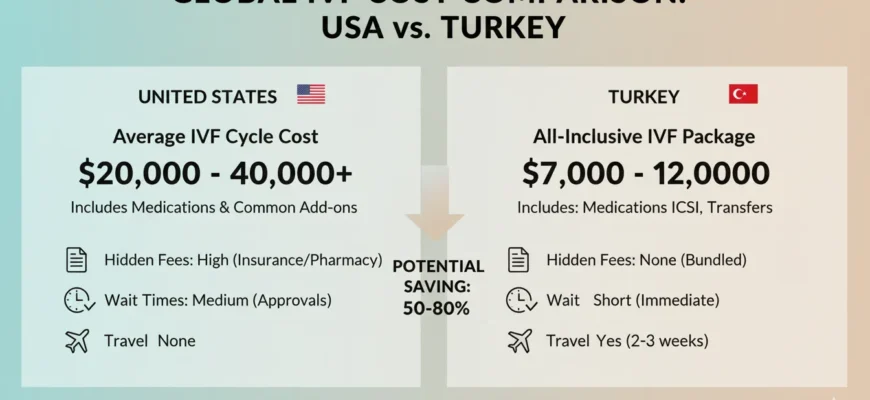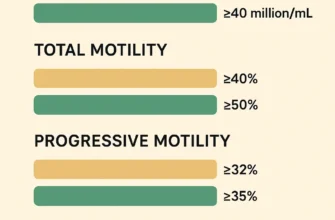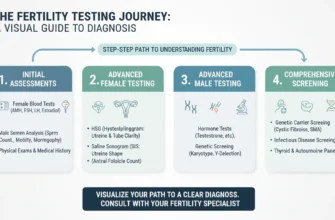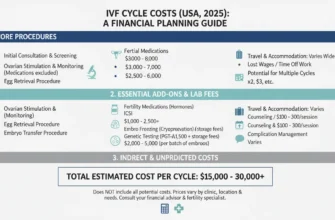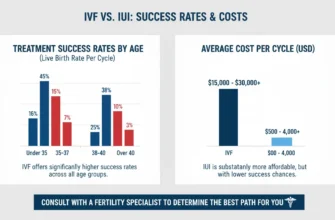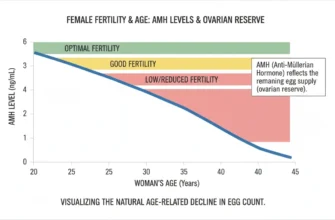IVF Payment Plans & Financing: Turkey vs. USA – An In-Depth Comparison
Individuals and couples in the U.S. face some of the world’s highest IVF costs, with complex, credit-driven financing systems but broad access to advanced medical technologies and assisted reproductive options like surrogacy and egg donation. By contrast, Turkey offers transparent, affordable, package-based IVF pricing at internationally accredited clinics, catering to self-paying “fertility tourists” but with legal restrictions on third-party reproductive options like donor eggs and surrogacy. Choosing a country for treatment depends on eligibility, cost, legal frameworks, and a comprehensive understanding of the entire process – including all additional and travel-related costs.
Navigating the Financial Landscape of IVF Parenthood
In vitro fertilization (IVF) is often a crucial solution for hopeful parents worldwide. Yet the process is not merely medical – it is also deeply financial. In the U.S., IVF is now mainstream, with over 95,000 babies born from IVF in 2023, and roughly 42% of American adults reporting direct or indirect experience with fertility treatments. As both demand and technology grow, the financial realities of IVF have become central to the decision-making process.
The Dream of Family: Financial Realities of Fertility Treatment
IVF and related assisted reproductive technologies (ART) require a heavy financial – and emotional – investment. Costs accumulate through consultations, hormones for the egg stimulation phase, monitoring, egg retrieval, fertilization, embryo culture, possible genetic testing, and embryo transfer. Additional costs often arise for advanced techniques (such as ICSI, preimplantation genetic testing, or donor egg IVF), freezing excess mature eggs or embryos, follow-up visits, and medication. Without careful planning, these expenses can delay or derail the family-building journey.
Why Compare IVF in Turkey and the USA?
The U.S. leads in medical technologies, but high prices, patchy insurance coverage, and variable state mandates make access inconsistent. Turkey, on the other hand, has become a destination for affordable, high-quality, all-inclusive fertility treatments, especially for self-paying patients. Clinics offer international patient support, modern facilities, specialists trained in Western Europe and the U.S., and are JCI-accredited in many instances. However, differences in legal frameworks, treatment options, and cross-border logistics mean that a thorough comparison is essential before embarking on a decision.
The Fundamental Cost Divide: IVF Pricing in the USA vs. Turkey
United States: High Costs and Complex Additional Expenses
In the U.S., the average price for a single IVF cycle now ranges from $12,000–$18,000, excluding medications, which add $3,000–$7,000. Additional procedures (ICSI, PGT, fresh/frozen cycles, storage fees) may add thousands more, with some cycles exceeding $25,000. For many, successful treatment requires multiple cycles, pushing costs well into the five-, or even six-figure, range. Lab advances, personalized stimulation protocols, and genetic testing drive prices up, as do operational and administrative burdens inherent in American healthcare.
Other U.S. IVF-Related Costs:
- Additional procedures: ICSI, preimplantation genetic testing, embryo freezing/storage
- Medication adjustments: oral medication or injectables, tailored to ovarian response, higher or lower doses affect cost
- Post-treatment: Frozen embryo transfers, follow-up appointments, ongoing monitoring
- Cross-state logistics for certain procedures (e.g., ELITE IVF, collaborative “hybrid” programs)
Turkey: Affordable, Transparent IVF Pricing
Turkish IVF clinics offer dramatically lower prices: a full IVF cycle generally costs $3,000–$5,000 at a leading clinic, frequently including consultations, IVF lab work, medication, and sometimes monitoring. Lower local costs of living, streamlined service delivery, clear package pricing, and government support for fertility tourism all contribute to this accessibility. Even with travel and accommodation, expenses for Americans are usually far below those faced at home.
What Turkish Packages Typically Include:
- Consultations and initial panel testing
- Ovarian stimulation and regular clinic visits
- Fertility medications (minimal stimulation options available)
- Monitoring and dose adjustment
- Egg retrieval, ICSI, and fertilization
- Embryo culture, freeze-all or fresh embryo transfer
- Some packages include accommodation and airport transfers
Legal Limitations:
-
Donor egg/sperm IVF, surrogacy, and traditional surrogacy are not permitted by Turkish law.
USA IVF Financing: Domestic Payment Plans and Funding
Health Insurance: Patchwork Coverage
A minority of U.S. states mandate coverage for fertility treatments, but national coverage is inconsistent. Most policies – when available – have caveats and exclusions for medications, genetic testing, or embryo freezing, and set lifetime maxes or require prolonged diagnostic “infertility” periods before covering ART. Most patients still pay significant out-of-pocket costs or face care delays while meeting insurance prerequisites.
Clinic-Specific Payment Plans
- In-house installment plans: Spread payments over several months
- Shared risk or multi-cycle programs: Pay upfront for multiple cycles, with partial refunds if not successful (eligibility is restrictive)
- “Bundled” packages may include Mini IVF, fresh or frozen cycles, or specialized genetic testing
Third-Party Lenders and Medical Credit
- Medical or fertility-specific loans: Fixed interest rates, repayments over 2–7 years; require a credit check
- Medical credit cards: 0% introductory offers, but retroactive high interest rates after promotional period
Grants, Crowdfunding, and Employer Fertility Benefits
Some clinics or non-profits award grants (e.g., RESOLVE, Cade Foundation), but selection is competitive. Employer fertility benefits are growing but depend on employer and insurance provider. Crowdfunding platforms now supplement these for some families.
Turkey IVF Financing: Simpler for International Patients
Upfront, Transparent Packages
Turkish clinics target medical tourists with simple, clearly-defined pricing, bundled as a single fee. Packages are generally paid via bank transfer or credit card. A deposit secures treatment dates, with the balance due before or at the start of treatment. Some clinics offer installment options (usually 2–3 stages); third-party medical loans are rare for non-residents.
Medical Tourism Agencies Facilitate Payments
Agencies coordinate all aspects – treatment, travel, accommodation, paperwork – and may negotiate enhanced packages or discounts. Their financial role is mainly as a point of contact for payments and logistical support, simplifying transactions and offering peace of mind for patient confidentiality and safety.
Cross-Border Considerations: Practicalities for U.S. Patients in Turkey
Payment Logistics
- Payments usually accepted in Euros, U.S. Dollars, or Turkish Lira; rates may be fixed or subject to change
- International wires incur fees from both sending and receiving banks; credit cards may incur 1–3% foreign transaction fees
- Online transfer services (Wise, Revolut, etc.) may offer better currency exchange rates
Travel Expenses and Administrative Costs
- Budget for round-trip travel, accommodation (2-3 weeks per cycle), daily expenses, and local transport
- Some clinics or agencies include hotel stays and airport pickup in their price
- U.S. citizens can visit Turkey for up to 90 days with an e-visa (as of October 2025 – always check latest rules)
- Budget for potential administrative or documentation fees
Follow-Up and Additional Costs
- After returning to the U.S., expect to pay for local follow-up care (hormone testing, ultrasound, obstetric consults)
- Embryo storage (frozen eggs/embryos) at Turkish clinics is possible at an additional annual fee
- Ensure long-term plans for follow-up care and contingency funds
Beyond Basic IVF: Financing Advanced and Third-Party Treatments
Donor Egg and Sperm IVF
- U.S. law allows and regulates donor egg/sperm cycles, but prices are high: donor egg IVF costs $30,000–$45,000. Patients may finance through medical loans, grants, or shared risk programs
- Turkey prohibits donor eggs, sperm, and embryo donation. There is no legal workaround for patients needing a genetic link from a donor
Surrogacy
- The U.S. offers both gestational carrier and traditional surrogacy, with legal frameworks varying by state; costs easily top $100,000
- Financing via specialized loans, employer plans (rare), or cash assets
- Surrogacy is illegal in Turkey for all patients, regardless of citizenship
Key Questions For Clinics and Financial Providers
- What is included in the IVF package, and what isn’t? (medications, Frozen eggs/embryo storage, genetic testing, monitoring, Mini IVF, travel expenses)
- Are there separate fees for advanced procedures? (ICSI, PGT, donor cycles)
- What is the complete, itemized cost estimate – including additional costs and administrative fees?
- For credit/loan products: What’s the APR, total repayment, origination, and prepayment penalties?
- What if the treatment fails? Are there any refunds or shared-risk plans?
- What is the privacy policy regarding patient records and confidential information?
- Who manages medical visas and administrative paperwork for international patients?
Making an Informed Financial Decision: Turkey vs. USA
Choosing the right IVF destination means carefully weighing eligibility, family-building goals, legal restrictions, quality of fertility clinics, and – above all – total cost. For many U.S. residents, the affordable solutions and transparent pricing at Turkish clinics make a compelling argument. However, those needing donor eggs, sperm, or surrogacy must consider the U.S. (or other countries where these procedures are legal).
A comprehensive, itemized budget – including medical, travel, administrative, and post-treatment care – reduces stress and supports an empowered decision. The fertility journey is challenging, but well-informed financial planning opens doors to parenthood that might otherwise remain closed.

